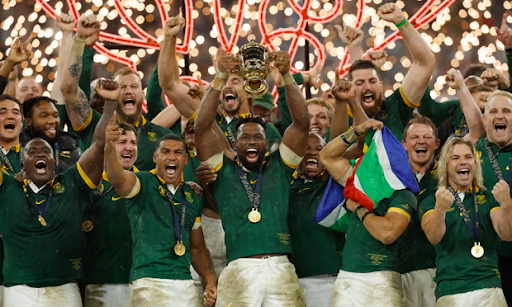
South Africa completed one of the most cinematic arcs in a Rugby World Cup to date on Oct. 28, beating their longtime rivals in New Zealand 12–11 to win the tournament for the fourth time. The final was excruciatingly close, but it arguably may not even have been South Africa’s closest shave of the tournament: they won their quarterfinal and semifinal by the same slim one-point margin, and played most of the latter on the back foot. South Africa were unable to score a point in the second half of the final and nearly saw their early 12–3 lead disappear completely, but in the vital moments of the game, they performed to their best.
There has been an air of inevitability surrounding South Africa since they edged out host nation France 29–28 in the quarterfinals. I thought New Zealand would win the final, but from the moment Handre Pollard’s nervous first kick of the night took a lucky bounce off the post and through the uprights to put South Africa ahead 3–0, some unseen force seemed to be on their side. New Zealand helped out with some crucial errors. Their captain, Sam Cane, managed to get himself red-carded inside the first half hour, an almost unforgivable error given his stature and the occasion. Richie Mo’unga missed a conversion that would have put New Zealand ahead and Jordie Barrett missed a potentially game-winning penalty kick a little while later. Both were difficult kicks — not automatic by any means — but in a World Cup final, with the margins between victory and defeat so small, missing both kicks was fatal.
As a New Zealand fan, maybe it is selfish to be thinking about those missed opportunities after such a dramatic final. Still, the litany of chances they had to win is going to stick with me for a long time. Despite playing the lion’s share of the final with a man down, they spent ample time in South Africa’s territory and seemed a constant threat to score in the second half of the game, only to turn over the ball or give away a penalty with a lapse in discipline. The loss would have been easier to take if South Africa had ruthlessly punished New Zealand’s sloppiness and won by 30 — instead, New Zealand battled back and looked the stronger team down the stretch, only to fall ever so slightly short.
Though I did not want them to win, South Africa’s storyline this tournament has been nothing short of scintillating. Winning each elimination game by a single point is not only without precedent in World Cup history, but would sound like fiction had I not watched it happen. What better way to win the biggest trophy in the sport? South Africa were never at their best in this tournament, but, as I wrote last week, being able to win under suboptimal conditions is arguably a bigger mark of a champion than performing well on your best day. They are not the best-ever World Cup team — that honor probably goes to New Zealand in 2015 — but they are the most resilient.
Still, my appreciation for South Africa’s epic run will not be enough to quell my disappointment at New Zealand’s loss. World Cups taking place just once every four years is a cruel trade; fans exchange a few weeks of utter exhilaration for an agonizingly long wait for the next tournament after their team almost inevitably falls short of the trophy. From being in position to kick a winning penalty this past weekend, New Zealand now must go back to the drawing board. Aging veteran players will not be there for the 2027 World Cup. It is a harsh truth of sports and life that you cannot allow yourself to linger too long in the past, or else it will hopelessly distract you from the present and future. And it is hard — lamenting the past is counterproductive, but is often the natural instinct for the heartbroken. How to set aside the pain of coming so close to the biggest prize in rugby when another chance will not come for four years?
Forget four years, the week after a big game is more than enough time to obsess over all the opportunities the losing team had to win. Missed kicks and fumbled passes have been streaming through my mind, irretrievable chances left behind. During the event itself, even when New Zealand’s chances looked bleak, I was oddly calm, like I had been looking at a tape from 2007 rather than watching the final in real time. New Zealand were so error-prone that I found myself without complaint towards their eventual loss; South Africa, despite their more difficult run to the final, were the more accurate and disciplined team. The eventual scoreline reflected that. When the final whistle blew, I was at peace. Only now is the pain setting in.
















